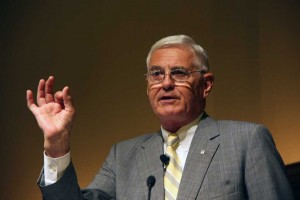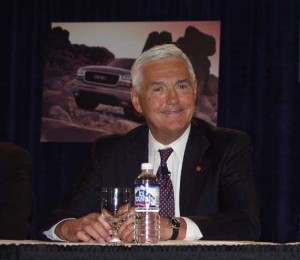
Whether in or out of bankruptcy, says "car czar" Bob Lutz, GM is about to face a "cleansing fire."
It’s down to the proverbial wire for General Motors. Within the next several days, the automaker will either work out a last-minute settlement with bondholders or face a historic bankruptcy filing.
To some, bankruptcy or not, there’s an equally significant event occurring with the retirement of GM’s Vice Chairman and “car czar,” Bob Lutz. The spry septuagenarian executive surprised the automotive world when he joined the automaker, early in August 2001 for what was supposed to be a couple-year assignment helping rebuild GM’s once-legendary product development operations. As he leaves, there’s little doubt that the carmaker is building some of the best products it’s made in decades, if not, as he suggests, “the best in our history.” But what happens “if and when” it goes into court-appointed bankruptcy protection?
That was the central theme of a speech by the former Marine pilot to the Automotive Press Association, on Thursday. While he acknowledged there are many unknowns, Lutz insisted, “We will pass through the cleansing fire of a radical restructuring — whether in or out of court” and emerge a “smaller, leaner powerhouse.” Surprisingly, the traditionally conservative Lutz said much of GM’s potential turnaround can be credited to the Obama Administration, which is the first administration “in decades” to actually pay attention to “the largest manufacturing industry in the country.”
Following his speech, Lutz offered his thoughts on a variety of other issues in this question-and-answer session.
 Q: It seems certain GM will declare bankruptcy by the June 1st deadline set by President Obama.
Q: It seems certain GM will declare bankruptcy by the June 1st deadline set by President Obama.
Lutz: It’s a matter of ‘if,’ and not when. And if we do, we intend to get in and out very, very soon.

A staunch conservative, GM Vice Chairman Lutz nonetheless has plenty of praise for President Obama, the first president "in decades" to actually listen to the issues facing the auto industry.
Q: What’s going to be the immediate impact of a Chapter 11 filing on sales?
Lutz: We’ve done research, especially after the Chrysler filing, and we know that automobile companies that go into bankruptcy have lower sales, one of the reasons you want to get in and out as quickly as you can. If bankruptcy does happen, we expect a strong statement of support from the federal government saying, ‘Buy these cars with confidence, we’ll see your warranty through,’ and so forth. But, still, there’s a difference between buying an airline ticket from a bankrupt airline and buying an automobile from a Chapter 11 auto company, just because of the size of the financial commitment.
Q: Aren’t you concerned about the government owning such a large part of the business?
Lutz: No, I’m not. I think the media often make the mistake of saying, ‘ha, now the government has us in its clutches and will make you build little, green econoboxes that get 45 miles a gallon,’ which, by the way, nobody will want to buy. That’s not it at all. The government would like the taxpayers money to come back out, and the best way to make that happen is to make us financially successful. I think the government is going to want us to build the kind of cars Americans want to buy.
Q: What about the awkward political compromises that invariably seem to occur?
Lutz: What I think is a huge advantage we’ve never had before is that thanks to the (Obama Administration’s) Automotive Task Force, we have somebody in Washington we can talk to. Other countries have a Ministry of Industry with an automotive section, China has a government group that looks after the automotive industry. We’ve had nobody, when you think of it. We couldn’t talk to the President, we couldn’t talk to the Vice President. What were we going to do, walk around talking to hundreds of Congressmen, none of whom truly cared unless they had an auto plant in their district? Compared to working in Europe, here in the States, it was a continual point of frustration. But now we finally have someone to talk to.
Q: You almost sound like a Democrat.
Lutz: Hey, the auto industry has been equally beaten up by Republicans and Democrats, over the last 30 years. We were everybody’s least favorite stepchild. Now, I think that’s changing.
Q: In recent years, GM executives, including yourself, often talked about the ‘wellspring of support’ from the American public. Did you over-read that, and how difficult will it be to win back public support?
Lutz: You know, Paul, I think it was true when we said it; and it’s less true now. What we’ve faced is a demographic shift. The people who used to form that really solid core audience with faith in General Motors are my age or older and not buying a lot of vehicles anymore. They’ve been replaced by a bunch of 40, 50 and 60 year-olds who’ve never known anything but imports, which is part of the reason for the domestic market share decline. It is very hard to open their minds and consider domestic vehicles again because these people are perfectly happy with what they’re driving. The design, engineering and quality deficits (of Detroit products) have all been erased. What’s going to be hard to erase is the reputational deficit.
Q: How do you do that?
Lutz: I don’t know, but if you’ve figured that out, we’re going to hire you for a lot of money.
Q: We’ve already seen a number of suppliers crippled by Chrysler’s bankruptcy. What is GM doing to deal with its suppliers.
Lutz: Steps are underway, without getting too specific, to protect suppliers. Everybody realizes steps have to be taken to prevent putting them under. Our assumption is that if we go through court proceedings, everyone would have an incentive to get in and out as quickly as possible. What would be damaging would be a Chapter 11 that goes on for months and months and months and everyone is faced with uncertainty.
Q: How would a bankruptcy affect your competitors?
Lutz: Frankly, though I hate to say it, but I think for our competitors, the impact of a filing is going to be positive.
Q: You’re going to sell a significant stake in your European operations. Should you be worried if the buyer is Fiat, since they’re also likely to take control of Chrysler?
Lutz: I think you’re making the assumption that Fiat would be the partner with Opel — and that is by no means a certainty. But it is clear that that would take some complicated sorting out.

"Maximum" Bob Lutz in better days. The question of legacy is more than just good products developed under Lutz, but whether GM can continue to build competitive vehicles after Lutz leaves.
Q: As you leave GM, there appear to be a lot of great new products in the pipeline, but what about the generation after that? And do you feel that GM has enough resources to put into them?
Lutz: I ‘m confident, but Iwouldn’t be if we didn’t go through this sort of catastrophic reorganization. We’ve spent $103 billion on health care over the last 15 years. And ever since I’ve been at GM, we’ve been constantly forced to cut the product budget and the capital development budget….to pay for part of that. It’s not like we’re going to be constrained in the future; we have been constrained in the past. I look forward to the day GM has a decent balance sheet. I’m very confident we’ve worked out the product line for the next five years and under any reasonable scenario we could afford some great things.
Q: Is that, then, your legacy?
Lutz: It’s not just how much you do, but how well you do it. And you could say that General Motors’ product plans of the ’70s and ’80s and ’90s were not that hot. My term is brilliantly executed mediocrity. If there’s one lesson — and I hope it’s my legacy at GM — I am reasonably confident that the whole organization understands that there’s no such thing as good enough when it comes to product.

Paul
Great interview.
Cheers,
John
Thanks, John, Bob was in great form yesterday. One thing the story does not mention is that Lutz (hinted/promised/threatened?) to continue working somewhere in the industry. I simply couldn’t imagine the car business without him and considering the vitality he exudes, I suspect he could continue as long as his father, who worked until 6 months before passing, at close to 95.
Paul A. Eisenstein
Bureau Chief, TheDetroitBureau.com